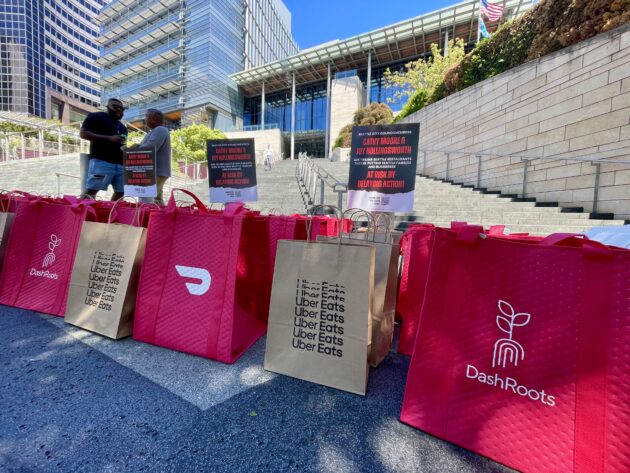DoorDash is increasing delivery fees for customers in Seattle, citing what it calls “extreme regulations” passed by the city — including a new law that gives app-based workers more transparency when they’re removed from platforms.
Consumers in Seattle will see higher service fees on all orders, starting this month.
“To be clear, we are increasing some fees in an effort to continue delivering in the city — a market in which DoorDash operated at a loss in 2024,” DoorDash wrote in a blog post.
The delivery giant, which reported $3 billion in revenue during the first quarter, calls Seattle “the most expensive market to facilitate delivery” in the U.S., by a wide margin.
DoorDash didn’t say how much fees will increase.
The move comes as a new driver deactivation law is implemented. The law, originally passed by the Seattle City Council in August 2023, was designed to provide more job security to app-based couriers, delivery drivers, and other service providers.
Under the law, companies must give workers a 14-day notice of deactivation, base deactivations on “reasonable” policies, and provide workers with records behind their decision.
The ordinance was supported by gig worker advocacy groups who said that it would help to protect workers from being unfairly deactivated. They said companies had too much power to deactivate workers, leading to workers being unfairly punished for things like rejecting too many orders or being unavailable during certain times.
The legislation was the first of its kind and goes further than efforts by other municipalities to regulate deactivations. It’s part of a broader attempt by Seattle lawmakers to regulate the gig economy.
The deactivation law applies to gig workers who deliver food, shop for groceries, and complete other tasks via on-demand apps. It does not apply to drivers who transport passengers, who are covered under Washington state law.
Uber and Instacart filed a lawsuit late last year to stop the enforcement of the law over constitutional concerns, among other allegations. A federal judge denied that effort in January.
The law was effective starting in January and its “Administrative Rules,” or detailed implementation guidelines, were effective June 24.
The city’s Office of Labor Standards says it has received more than 150 worker inquiries since January. It shared multiple messages from workers thanking the city for help with reactivation.
“Through ongoing outreach and education, OLS staff have reached thousands of gig workers and ensured they are aware of their rights under Seattle’s Deactivation ordinance,” OLS Director Steven Marchese said in a statement. “These efforts have proven to be effective as we continue to receive positive feedback from app-based workers in response to our support of workers’ transparency and due process rights under this law.”
Companies are required to report certain records on a quarterly basis. Starting in June 2027, the city will be able to investigate whether companies deactivated workers for a permissible reason.
Instacart, Uber, and DoorDash were embroiled in a battle last year with Seattle lawmakers over a new minimum wage law.
In its blog post Tuesday, DoorDash said the new laws have reduced driver earnings and increased delivery delays. It said average monthly revenue per store fell 2% a year after the minimum wage law went into effect. It also cited an “increase in fraud,” citing a small number of drivers who allegedly prolong deliveries to increase pay.
Read the full article here










